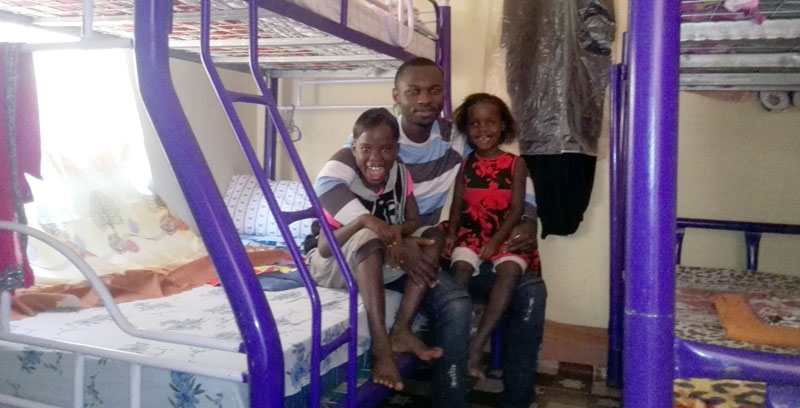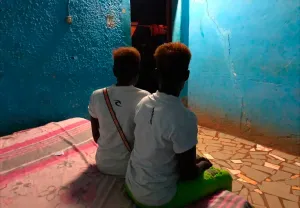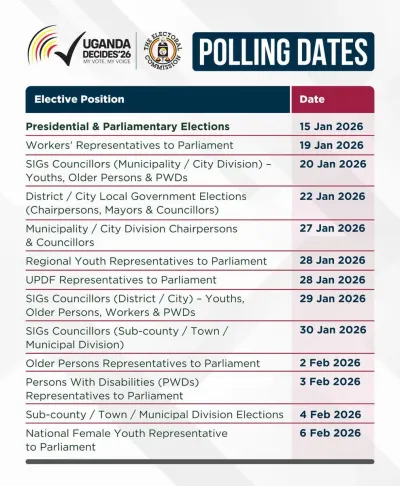

Zion children’s orphanage C.E.O with the children inside their new home
A study finds that 35% of the estimated 40,000 children in orphanages are either too young or too old to be there as per the law governing the institutions.
Over the years members of the public have considered institutionalized/ Residential Care homes commonly known as orphanages or children’s homes, as the first option for vulnerable children.
But experts say these institutionalized homes have long-term detrimental effects on individual lives.
Now there is a target for UN member states to phase these institutionalized homes out, as a form of alternative care for children by the year 2030.
Experts say that all children should be raised in a family environment. The concept of alternative care for Children stipulated in Uganda’s National Alternative care policy, Orphanages/Residential Care should be the last resort after trying all the other options that can offer a family environment for a child.
Research shows that up to 40, 000 children in Uganda are currently in orphanages or institutionalized alternative care homes, which worry child rights activists.
Although poverty is the biggest driver of separation of children from their families among other factors like domestic violence, parental death, and children with disability, experts argue that lack of knowledge in the wider society about the limitations and dangers of institutionalized care homes, continues to lead to the growth of the homes, despite international efforts to phase them out.
Experts say that a child’s physiological, psychological and social wellbeing is better served in a parental environment, or extended family environment as opposed to institutionalized homes.
According to the Continuum of Alternative Care for Children, any child should be under parental care but if it is not the case then they should be under Kinship (Extended family) care.
Foster care can be another alternative followed by the Guardianship, not forgetting Adoption and then the Supported child-headed households. But the last resort alternative care should be Orphanage/Institutionalized homes.
Ismael Ddumba Nyanzi, a researcher and consultant on Alternative care for Children in Uganda explains that whereas institutional homes should not be the first option for children separated from their families, the 2019 analytical report indicates that the majority of the vulnerable children in these homes are not supposed to be there.
Ddumba reveals that in a recent study they found that between 40,000 to 50,000 children in Uganda are currently in orphanage or institutionalized alternative care homes. However 60% of these children have a known parent or member of their families.
The study indicates that 10 % of the children in these homes are below the age of 3 which is not appropriate according to Early childhood Development experts. Having children below the age of 3 in an institutionalized/Orphanage home is against the regulations governing these homes.
Experts reveal that up to 25% of the residents of these homes are actually not children anymore; they are above the age of 18. Ddumba who was part of this study says that such a scenario is very unfortunate for the country because the homes are raising people who cannot sustain themselves or even contribute positively to their societies as they turn into adulthood.
When asked whether as a country, Uganda still needs this Institutionalized alternative care homes, Ddumba noted that we cannot close the institutions immediately, adding that it is a long term process.
He instead called on the government to put up supportive programs for families to take care of vulnerable children and also address key drivers of child separation from their families if the country is to gradually phase-out orphanages by the year 2030.
“So we recommend that the government implements the provisions in the National Child policy recently passed whereby the government is expected to partner with other stakeholders to establish a program that will support certain families to raise responsible children. We are optimistic that with arrangement the numbers of children separating from the families because of poverty and other reasons will go down”-Ddumba says.
Now because alternative care is a formal/informal arrangement which can be temporary or permanent for a child who is living away from his or her parents, experts are reminding the public that putting any child under these homes should be for a short period of time.
For instance if a child is abandoned at any one point, the institutionalized home can only take care of that child for a short period of time as the authorities look for a family that can take up this child.
Frank Mugabi, the Public relations officer at the Ministry of Gender, Children and Youth Affairs, says that members of the public and stakeholders should always look for relatives or members of the extended family or any other family that is willing to take up these vulnerable children instead of opting for the orphanage or children’s homes.
“The target of having no more institutionalized homes by 2030 is achievable, every child has relatives so it is about looking through a long line of relatives to find out who of those is able to stay with this child, if that is not possible then you look for another family that can take up this child so that they can take care of this child and grow them in the welfare and full rights they deserve.so if you look at those two aspects everything is achievable, what is lacking now is sensitizing the public”-Mugabi notes
Child rights organizations are concerned that Orphanages are considered as the quick option because it is what many people know while the other inherent forms of care (Kinship) that is part of the African culture is slowly dying away with deterioration of cultural norms.
The Executive Director of the Uganda Children’s NGO Network (UCNN) Damon Wamara expresses concern that there is a fear that as the good positive cultural practices continue to fade, our family values and commitments fade away.
“It is known that if a child loses a parent in all cultures, the child can never lack a family to belong to but these days people are being do individualistic ……culturally when a child lost the parents it was not optional in case you are the elder brother you take over or if there five boys they were divided amongst the family and its known that these people have taken over,” says Damon.














Solomon Lubambula
Leave a Comment
Your email address will not be published.